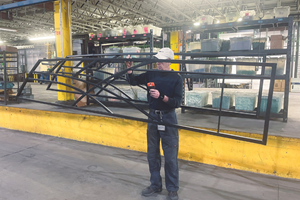Breakthrough in Total Closed Loop Recycling
At Honeywell CPG Greenville, Total Closed Loop Recycling is not a dream or a concept anymore…it is a reality in the day-to-day plant process...
Honeywell Consumer Products Group had a problem with seasonal rust issues at their Fram Passenger Car Oil Filter plant in Greenville, Ohio. The summer months in central Ohio are the worst time for rust issues. High humidity puts the Fram process to its toughest test. The critical location in the production is the canister washing process prior to final finishing. Filter canisters are conveyed through a three-stage washer consisting of an alkaline solution wash, a clean rinse and a final dry before entering the powder paint process. Rusty Whittaker, Fram’s paint room technician, remembers several times when the canisters came out of the washer with rusty bottoms after a slight stop in the process. Each rust-laden canister had to be removed from the line as scrap.
Agust Roestamadji, senior process engineer at Honeywell, was given the task of developing a robust process for cleaning the filter product and removing rust from the equation. Together with Matthew Wooton, of Honeywell, they formed a team to study the rust issues. Using the DFSS method (Design For Six Sigma), they charted the product flow process, outlining critical sub-processes and collecting data for design of experiments to determine the root cause of the issue.
The problem statement was “rust issues,” while the desired outcome was “clean filters,” but the desired outcome needed to be achieved and maintained through a guaranteed cleaning system.
“We found that as the filters ran through the washer on the conveyor belt there was a splash-back on the bottom of the filters that was not completely rinsed off at the end of the washer. The filter bottom rings would come out wet; any residual cleaning chemistry that was left on them would promote rust, particularly in high humidity months such as August. Even the post application of rust inhibitors did not help,” stated Mr. Wooton.
Once the problem was isolated at the washing process, the next step was to determine the objective of the project. The team established three objectives: eliminate all potential rust issues from the cleaning process in the washer; stabilize the washing process and reduce operating costs.
Prototype Total Closed Loop Recycling System
In March 2001, Mr. Roestamadji purchased a prototype system that recycled cleaning solution from Honeywell’s heavy-duty oil filter washer using state-of-the-art ultra-filtration. In collaboration with Lyle Carman, technical director of Ransohoff’s Environmentals Group, and Robert Yeggy, formerly with Bay Technologies LLC, Mr. Roestamadji developed a total closed-loop recycling system with zero discharge to the municipal sewer-line. The system is comprised of a two-stage washer, an ultra-filtration system, a reverse osmosis unit and an aqueous pH neutral chemistry that allows for a semi-automatic continuous recycling of the washing solution.
Since waste elimination, lean manufacturing and increased value-added activity are best practices employed throughout Honeywell, the Heavy Duty Department prototype total closed-loop recycling system employed all three practices, yielding zero discharge, reduction of chemical use, streamlined and flexible process, increased throughput as well as a better quality product. These are all elements of the DFSS method and are verified by the PFMEA process (Potential Failure Mode and Effects Analysis) to be a true robust solution.
pH-Neutral Chemistry
Mr. Wooton performed several designs of experiment with a pH-neutral chemistry that was first used in conjunction with the Heavy Duty Department prototype total closed-loop recycling system, proving that it is still an excellent choice to provide good canister cleaning as well as rust inhibition without a final rinsing. This chemistry is named Evercycle and was developed by Vito Altavilla and Mr. Yeggy. The actual technology is owned by Bay Technologies, LLC and has been licensed to Ransohoff, Inc., for manufacture and distribution. Mr. Yeggy explained the Evercycle, “Unlike traditional alkaline chemistry, the chemistry cleans the product mechanically and does not form any chemical reaction, the tiny molecules of the chemistry penetrate the dirty surface of the product and lift the dirt away to be rinsed off. The chemistry also forms a very thin layer of coating on the surface of the filter to protect it and keep the larger rust molecules from adhering to it through deionization.”
The traditional wash-rinse-dry process can be converted to a simple wash-dry process using the Evercycle product. Marrying the total closed-loop recycling system with new chemistry has cut the Heavy Duty Department washing process time from three minutes down to 55 seconds, yielding a higher throughput.
Mr. Roestamadji noted a stringent requirement for the powder coating process immediately following the washing process. Powder adhesion is greatly affected by residual alkalinity, as in a traditional washer using alkaline cleaners. Honeywell CPG Greenville has been using Evercycle since 2001, and it has demonstrated its full potential in rust inhibition, especially in powder adhesion during every season.
Another interesting benefit is that the chemistry will pass through a 0.1-micron filter membrane with 99.9% efficiency. It creates a thin particle coating on the membrane to keep it from fouling. The membrane filters all impurities and then allows only clean solution to pass through into a clean tank, where it is stored for re-use in the cleaning process.
Denise Garland, health, safety and environmental technician for Honeywell and team member, stated, “In order to be an environmentally friendly facility in Greenville, we must limit the wastewater contaminant discharged throughout our processes, but we have the system that makes us a zero discharge facility. The total closed-loop recycling system has generated a tremendous savings of more than $100,000 a year from waste hauling cost alone.
“The Honeywell environmental team investigated the (Evercycle) to be user friendly, since there is no need for extensive personal protection equipment to be used because its true neutral pH. In addition, we are not exposing our personnel to a hazardous or toxic solution anywhere in the process; that is a big benefit for our facility in meeting EPA requirements,” she concluded.
From Heavy Duty to Passenger Car
The next step for the Team in the Passenger Car department was to put action items together with their respective milestones and a completion date for an installation of a cleaning system. The prototype recycling system in the Heavy Duty Department had been proven and studied by the Greenville Team for more than a year and gave them an edge in the developing the current project. Because of his experience, Mr. Roestamadji needed only three months to implement the passenger car project from start to finish. The existing washer did not have to be replaced; he installed a total automated recycling system that uses Evercycle with only a few plumbing and minor modifications to the existing washer to cascade the clean solution through its wash stages. Each stage in the washer was set up with a conductivity meter to supply data to the plant data network for monitoring purposes.
This data collection has allowed Honeywell to control process capability, water use and chemistry level in the solution. Process variability is reduced through process monitoring to achieve Six Sigma objectives.
Sustaining Gain
Looking at the rust tests, powder coated canister surface analysis and the collected data from the system after it has been running more than a month, the result has exceeded the Greenville plant expectations. All the objectives have been met with great satisfaction, even the unexpected savings in various areas.
"Another savings is in the cost of poor quality,” noted Mr. Wooton. “My biggest concern is quality. There were times when we would have to go through our stock to check for rust, actually open the boxes and pull individual filters out. This was costly and time consuming, since we also had to check audit codes and determine exactly when these filters had been processed to find out the root cause of the issue.”
Larry Stapleton, paint and finishing technician for Honeywell and a key stakeholder in the development of the Heavy Duty Department prototype total closed-loop recycling system, said, “We have found that we no longer need to preheat the filters prior to powder coating. We removed the preheat ovens six months ago, saving money on energy costs and space. The filters are coated with powder from Interpon, cured using infrared and UV. Salt spray tests, humidity chamber and impact tests show improvement in paint adhesion that is better than it was prior to new chemistry conversion.”
“Actual dwell time in the wash stage,” stated Mr. Roestamadji, “is 35 seconds, which cannot be accomplished using an alkaline solution in the process. It took almost two minutes for the parts to go through the wash and rinse cycle with the previous system, and even then they were not always clean.”
Mr. Whittaker commented, “We have also been able to lower the spray pressure from 30 to 15 psi and the temperature of the water from 150 to 110F. Lowering the water temperature alone has yielded another $40,000 of energy savings for the plant.” Another benefit he noted about the chemistry is that nozzles do not clog. “With the old alkaline chemistry, I would have to change 30-40 nozzles a month. The first week we had the chemistry in the system I changed about 30 nozzles, and since then I have not had to change another one.”
The cleaning chemistry not only cleans the filter product but also cleans the washing equipment itself. The case is clearly proven in the now two-year-old Heavy Duty Department prototype total closed loop recycling system where the washer equipment looks new to this day. The chemistry has kept the rinsers, nozzles and the conveying belt clean and looking as good as new.
Mr. Whittaker also found another benefit of the system. With the alkaline cleaner he could not leave canisters in the washer for even 3-5 min or they would rust severely. Any time there was a shutdown for that length of time; he would have to scrap 50-100 canisters. Even with rinse aids, the canisters rusted. During the first few weeks of the new system operation, a conveyor belt broke and the canisters were left in the washer for 2-3 hours, yet they emerged without any rust on them. “I did this as an experiment to see what would happen,” he said. “Usually, we would off rack the canisters and then re-rack them once we had fixed the belt. We didn’t lose any canisters by leaving them in the system.”
“One of the most important characteristics of cleaning chemistry,” noted Mr. Roestamadji, “is that it works with substances that are supposed to be taboo in filtration systems. We use latex adhesive as a sealant material on the Heavy Duty filter line. The excess latex compound used to dissolve in the any other cleaning solution and would block up any filtration membrane, but it does not do that in this system.”
Mr. Whittaker further commented, “The previous alkaline solution in the system combined with latex would plug the filter membrane after a few days of operation, I had to clean it every two to three days. With this system, all I have to do is monitor the process and clean it maybe every three months. It only generates 40-50 gallons of wastewater from cleaning the membrane, which we send to the central evaporator system.”
Mr. Carman of Ransohoff added, “The pH neutral chemistry provides a quantum leap in filtration technology because it keeps the membrane from fouling. We have several other operations such as Emerson Electric in Arkansas and the Ford plant in Sharonville, Ohio, that currently use the chemistry in their filtration systems.”
When cleaning the filtration membrane, Mr. Roestamadji has found that he can simply use a low dose of caustic solution rather than sulfuric acid. This process eliminated yet another hazardous chemical from use in the Honeywell plant.
“The total closed-loop recycling system here at the Honeywell’s Greenville plant is simple and easy to operate with minimal tasking because it automatically takes care of itself,” concluded Mr. Roestamadji.
Using the DFSS method has allowed the Honeywell team to achieve its goals. It has reduced costs and waste and has improved quality, performance and customer satisfaction. It is a huge success and, beyond that, Honeywell is proud to share its testimony with the industrial finishing world.
Because of the project’s success, Honeywell plans to replace the Heavy Duty prototype total closed-loop recycling system with another full-scale version. The DFSS method has helped Honeywell CPG Greenville to successfully eliminate the rust issues from its process while saving money in energy, process cost, labor, chemistry and water. Anyone can see the success of this Six Sigma process by looking at the bottom line.
For more information visit Cleaning Technologies Group, LLC, Ransohoff.
Related Content
Calculating the Cost of Powder Coating
How can you calculate the cost of powder coating a component if you only know its surface area? Powder coating expert Rodger Talbert has the answer.
Read MoreMasking Solutions Provider CFS Dramatically Expands Capabilities and Capacity
Custom Fabrication & Supplies (CFS) completed a new plant expansion packing 10 times the capacity into twice the space. It dramatically enhances the supplier’s custom capabilities to provide extremely precise and cost-effective masking solutions.
Read MoreProducts Finishing Reveals 2024 Qualifying Top Shops
PF reveals the qualifying shops in its annual Top Shops Benchmarking Survey — a program designed to offer shops insights into their overall performance in the industry.
Read MorePowder Coating Overcomes Post Forming
Six Sigma methodology, open communication, and collaboration produce results for leading boat manufacturer.
Read MoreRead Next
A ‘Clean’ Agenda Offers Unique Presentations in Chicago
The 2024 Parts Cleaning Conference, co-located with the International Manufacturing Technology Show, includes presentations by several speakers who are new to the conference and topics that have not been covered in past editions of this event.
Read MoreEducation Bringing Cleaning to Machining
Debuting new speakers and cleaning technology content during this half-day workshop co-located with IMTS 2024.
Read MoreDelivering Increased Benefits to Greenhouse Films
Baystar's Borstar technology is helping customers deliver better, more reliable production methods to greenhouse agriculture.
Read More











.jpg;maxWidth=300;quality=90)









